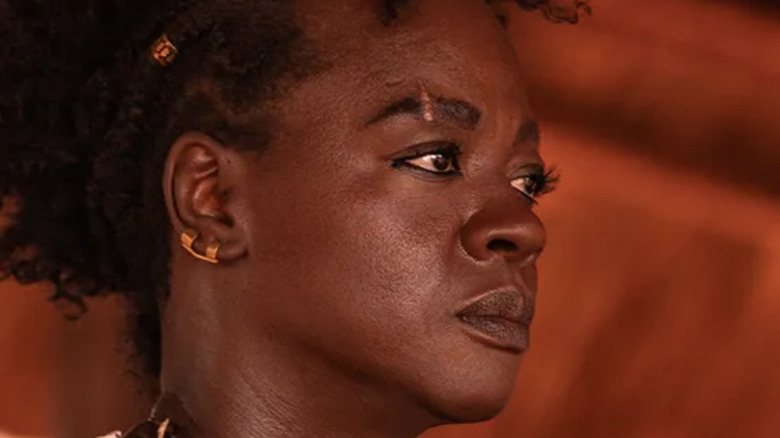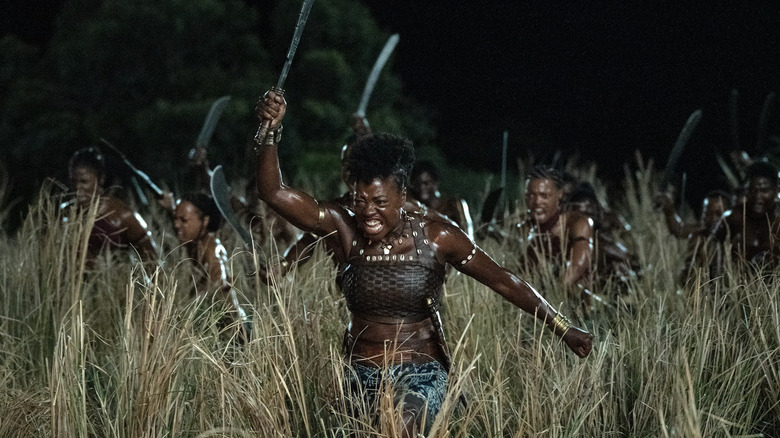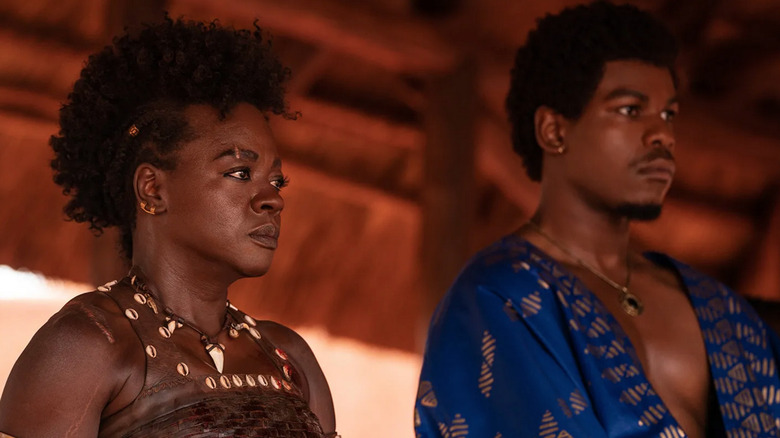The Woman King Review: Entertaining, Even If Historically Questionable
- Great acting ensemble
- Thrilling action scenes
- A feel-good movie about slave traders!?!
Let's be clear: most movies "based on true events" are heavily fictitious. Historical accuracy isn't synonymous with quality — many wildly inaccurate movies are still great! The more interesting question to ask isn't if these films made changes to history, but why they did. Some changes are for dramatic effect, others to convey a specific message, and sometimes it's just fun to pretend two real-life freedom fighters who never actually met gave each other piggyback rides with guns.
"The Woman King," directed by Gina Prince-Bythewood from a screenplay by Dana Stevens, strives for at least a texture of historical accuracy in its depiction of the West African kingdom of Dahomey and its all-women army the Agojie in the early 19th century. Given the relative scarcity of primary sources on Dahomey's history, it makes also makes perfect sense why, with a few notable exceptions, the movie invents its own fictional characters as a means of exploring the war between Dahomey and the Oyo Empire.
As a work of pop entertainment, "The Woman King" is a solid war film with strong production values and multiple great performances. When one approaches it with even a cursory knowledge of the actual history, however, the story becomes a bit unnerving. It strives to present an empowering feminist real-world answer to the Amazons in DC's "Wonder Woman" and the Dora Milaje in the MCU's "Black Panther," but the film is a mixed bag when it comes to balancing that positivity with acknowledgment of the darker aspects of Dahomey's history.
Viola Davis leads an awesome ensemble
The most predictable thing about "The Woman King" is that Viola Davis is absolutely excellent in the leading role of the Agojie general Nanisca. As she's done in previous roles, Davis' performance as Nanisca commands authority, delves intensely into depths of trauma, and seasons the intense dramatics with just the right amount of humor. Unlike in any of her previous roles, Nanisca also gives Davis the chance to fight. Seeing middle-aged women as action stars onscreen is a rare occurrence, and most examples of such (Carrie-Anne Moss in "The Matrix Resurrections," Michelle Yeoh in "Everything Everywhere All at Once," e.g.) have been actresses with previous experience in the genre. At 57 years old, this is Davis' first full-blown action role, and she's still fully believable as a seasoned warrior.
While Davis is the film's main star attraction, one of the big takeaways from "The Woman King" is that Thuso Mbedu seems destined to be a star herself. A South African TV actress who got onto American critics' radars for starring in Barry Jenkins' "The Underground Railroad" miniseries, Mbedu plays Nawi, a young woman given to the Agojie by her father after refusing to take an abusive husband. Nawi's questioning nature at first makes her an awkward fit in the highly disciplined regiment but eventually proves key to saving the day, a character arc that intertwines deeply with that of Nanisca.
The film's cast is strong all around. Among the other Agojie soldiers, Lashana Lynch, the most experienced action star of the bunch with "No Time to Die" and the Marvel Cinematic Universe under her belt, is a standout as Izogie, a likable lieutenant who mentors Nawi and is responsible for some of the film's most intense emotional moments. John Boyega plays King Ghezo, one of the few actual historical figures in the movie. Boyega is always a charming presence onscreen and it's great to see his career thriving post-"Star Wars." The way Ghezo is written, however, is emblematic of the film's greatest weakness in its approach to history.
Is The Woman King girlboss-ing slavery?
"The Woman King" opens with a "Star Wars"-style text crawl setting up the geopolitical situation: The Oyo Empire and its tributary state of Dahomey are at war, with the Agojie being Dahomey's strongest defense. The text also establishes that the Oyo are selling other Africans into slavery to the Europeans — while more vaguely acknowledging Dahomey's own well-documented culpability in the slave trade as merely part of a "cycle." The film's rousing opening action sequence gets the audience rooting for the Agojie when they free a bunch of captives from enemy slavers. It's an effective introduction to the movie, but a questionable introduction to an army that was guilty of the same crimes against humanity they're here celebrated for stopping.
To be clear, "The Woman King" doesn't full-on erase the dark side of Dahomey; the kingdom's involvement in the trans-Atlantic slave trade does get discussed, with Ghezo's dealings with Portuguese traders taking up a portion of the plot. Nanisca, who has had her own traumatic experiences in captivity, is fervently dedicated to challenging the institution and feels fully believable in her attempts to deal with this situation. Yet, this all ends up being a small part of a film that's far more interested in "you go girl" training montages, glamorized action-heroism, and assorted personal drama subplots than in reckoning with what it means to work within an unjust system.
Perhaps it's unfair to judge the film too harshly for focusing on the parts that are more inherently entertaining. After all, most people generally don't demand every film about the American Revolution focus on the evils of slavery. But there's a point at the end where awkwardness inherent in "The Woman King" crosses the line from uncomfortable to downright dishonest. Remember the criticisms of how "Hamilton" dealt (or didn't deal enough) with slavery? Imagine if it ended with Eliza successfully convincing the U.S. government to abolish slavery decades before it actually happened in real life, and you get the picture of just how far the conclusion of "The Woman King" diverges from history.
For a film sold on the virtues of its representation and empowerment, it casts an uncomfortable shadow on what's otherwise well-made popcorn entertainment. It's the "MORE FEMALE DRONE PILOTS" meme writ large, peppering "girl boss" feminism atop a problematic core. Still, those fight scenes are pretty awesome, and Nanisca is another great character for Viola Davis. Consider the overall rating an average: "The Woman King" is an 8/10 for entertainment value, and 4/10 for how it deals with history.


